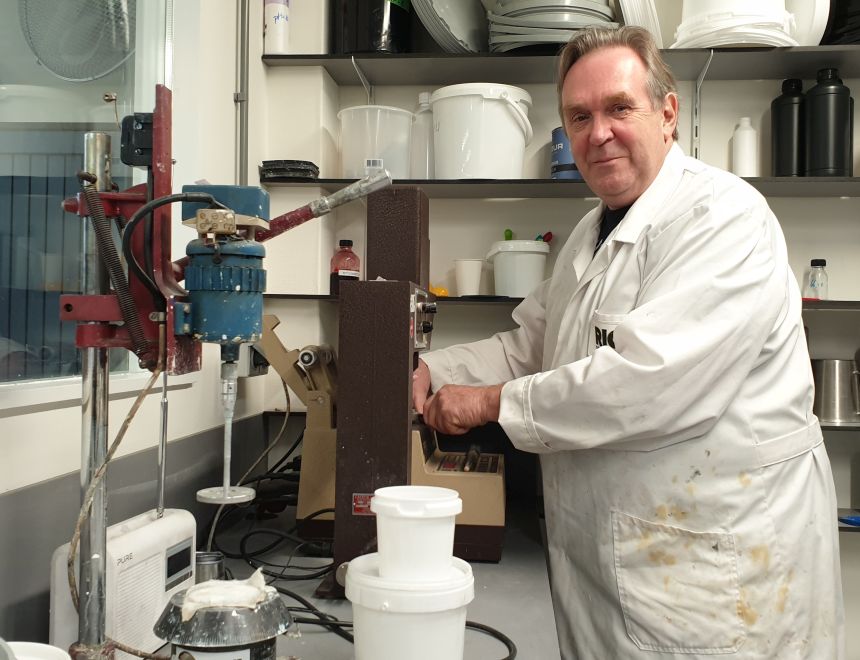Laboratory master Ger Duyndam, retired

Being a laboratory master is not just about making paint, but also about feeling and using your brain."
In 1975, when wall paint was still tapped into little pans you brought yourself, Ger Duyndam started working as a laboratory employee at RIGO Verffabriek. In the past 46 years, he distilled his own binding agents and flew around the world, from China to Lapland. He still remembers the time when drinking milk was an employee right. After all these loyal years of service, he will retire on 18 April 2021.
From harvesting bulbs to Verf Manufactorij RiGo
Before and after my employment, I worked for the COT laboratory (Centre for Development and Technical Advice). Here, I dissected paint. We made our own alkyd resins and acrylates. Even the binding agents were custom made. That is when I learned what paint is really made of. And that knowledge greatly benefits me now!
I stopped working there and took a few holiday jobs. Harvesting bulbs with those great bulb-digging harvesters. Then, my mother told me about a laboratory vacancy in a paint factory in IJmuiden. At the time, grandma and grandma Van Westerhoven were still at the wheel of Verf Manufactorij RiGo, but I had my application interview with their son Robert van Westerhoven, who sported an impressive lion's mane and beard. I was hired, and divided my days between working in the laboratory and the production department. I really had to get used to the IJmuiden folks in the production department. They were completely different from the "nerds" you found in a laboratory. On top of that, I sometimes filled in as a driver to take cargo to the North of North Holland, or to pick up granulate (little rocks) from those rigid Amsterdam folks in the Nieuwe Teertuinen. That was simply scary at times."
Environmentally conscious and milk right
"After half a year, I gained a full-time position in the lab. In 1978, the brothers Arnold and Robert took the wheel in the factory. The family became environmentally conscious very early. At the time, people thought water-soluble paint was good for the environment. As long as it was water soluble, the environment would benefit. After some life-cycle analyses, this turned out not to be true. Water-soluble paint is more resistant to yellowing, but it wasn't as good for the environment as we thought. That was when we started working on the development of real natural paints. This, in time, led to Linal, Maril and Linolux, to name a few.
We moved to our current location and merged with Evert Koning from Zaandam. I remember that, at the time, employees received milk. Milk was supposed to help against the vapours of the solvents. That wasn't true, but hey, it was simply one of the rights you enjoyed as an employee."
No briefcases, but among people nonetheless
"For a while, I flew around the world with Arnold to sell our cork lacquers. We went to Italy, Spain and Portugal, the birthplace of cork producers. We even went to China and Lapland. In Lapland, we were given a car with spiked wheels to make it through the snow, as well as one of the first mobile phones, with a huge battery block. That way, if we got stranded, we would be able to make an emergency call.
We often visited our customers to help them with the industrial applications of our materials, which we had tested with the machine supplier in advance. While Arnold went to have a chat with the director, I spoke to the employees. Other paint manufacturers with their fancy briefcases never made it past the director's office. People really appreciated the fact that we actually looked at the machines on the workfloor to get the complete picture."
Innovation through curiosity
"That's the advice I'd like to give my current and future colleagues. If you're part of the laboratory staff in a paint factory, you shouldn't just be able to make paint, but you should also always have an inquisitive attitude when it comes to chemistry and technology. It's about using your feeling and your brain. Be interested in everything, talk to the suppliers and make sure to read up on the information you need. That's the only way to achieve innovation.
These past years, Arnold's sons, Machiel and Toon - I was there for the birth of the latter - have been in charge of the paint factory. We have transitioned from a "technology-driven company" to a "market-driven company". Back in the day, we always made something first, and only then checked if we could actually sell it. These days, we first perform market research before developing our products. And while I sometimes think it's a shame that technology has become something of an underdog, this is a positive development. With all the expertise at our disposal, I'm sure we'll make many more great things in the future."
To the delight of his colleagues, Ger has not quite been able to let go yet. The old veteran still comes in 2 days a week to help draft safety sheets and figure out labelling regulations. The rest of the time, he will enjoy spending more time with his grandchild, sports with his son, trips with his wife Joke and listening to music (metal, K-pop and J-rock).
Ger, thank you for all your work these past and coming years!